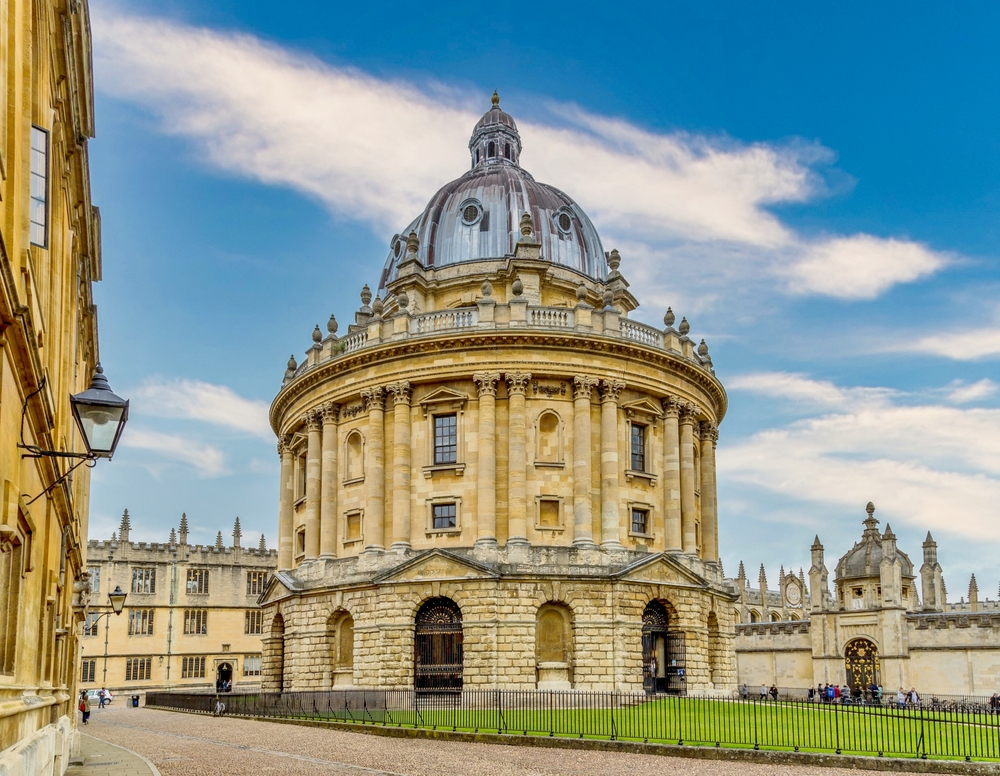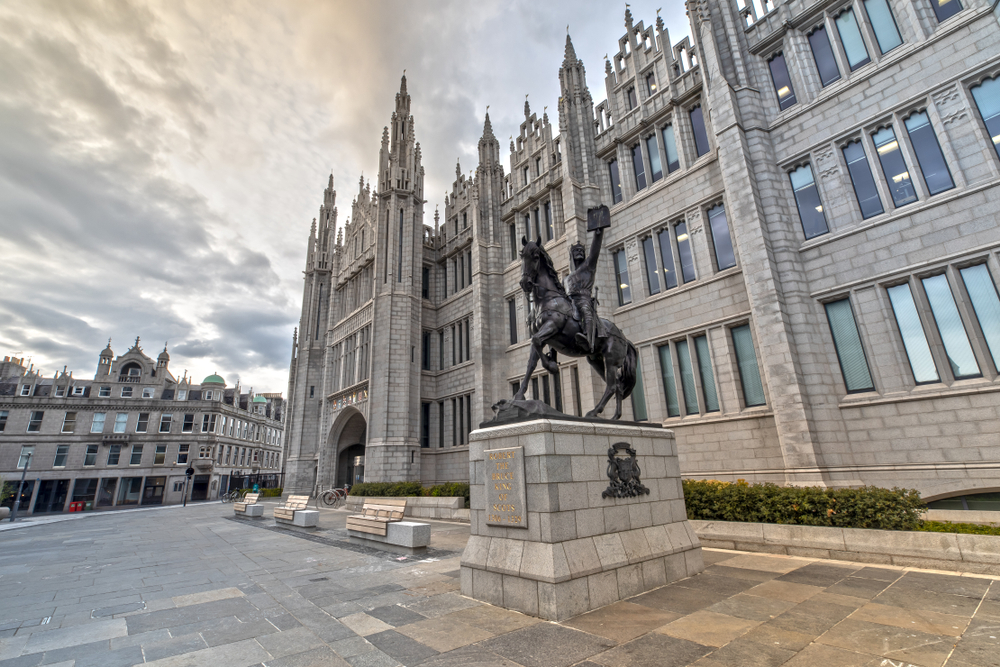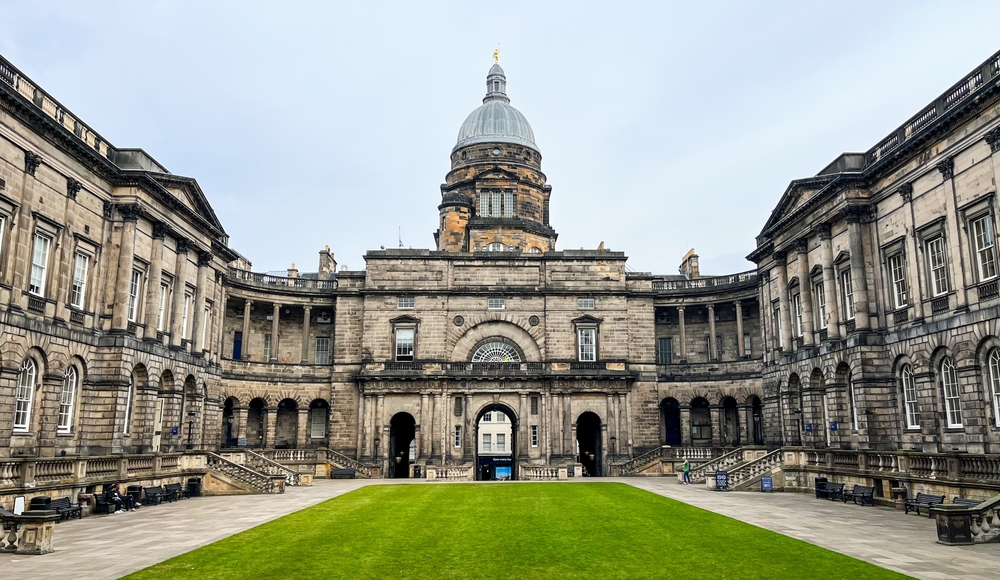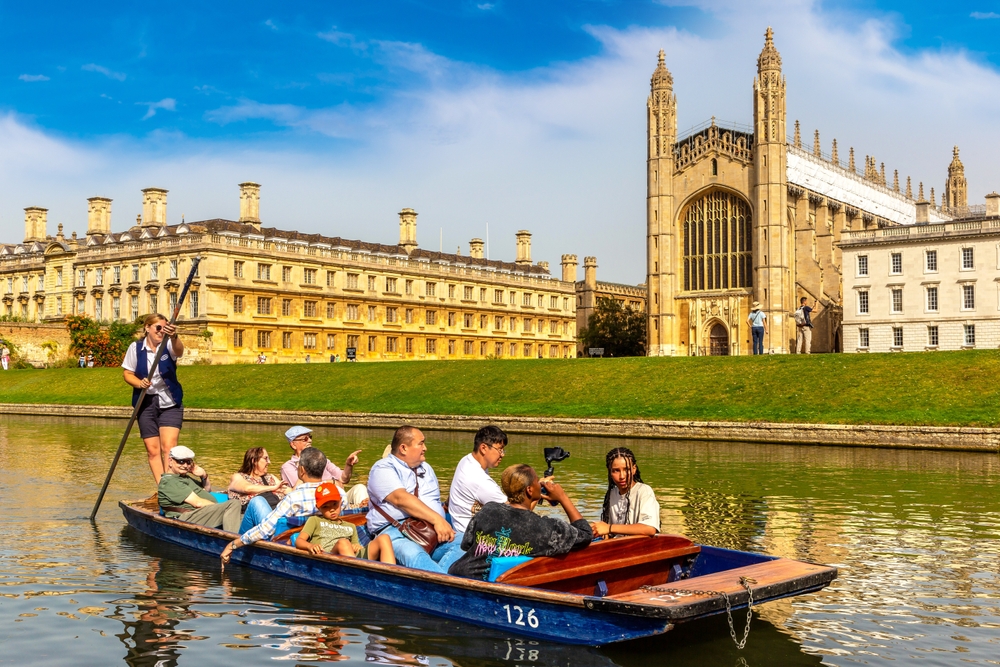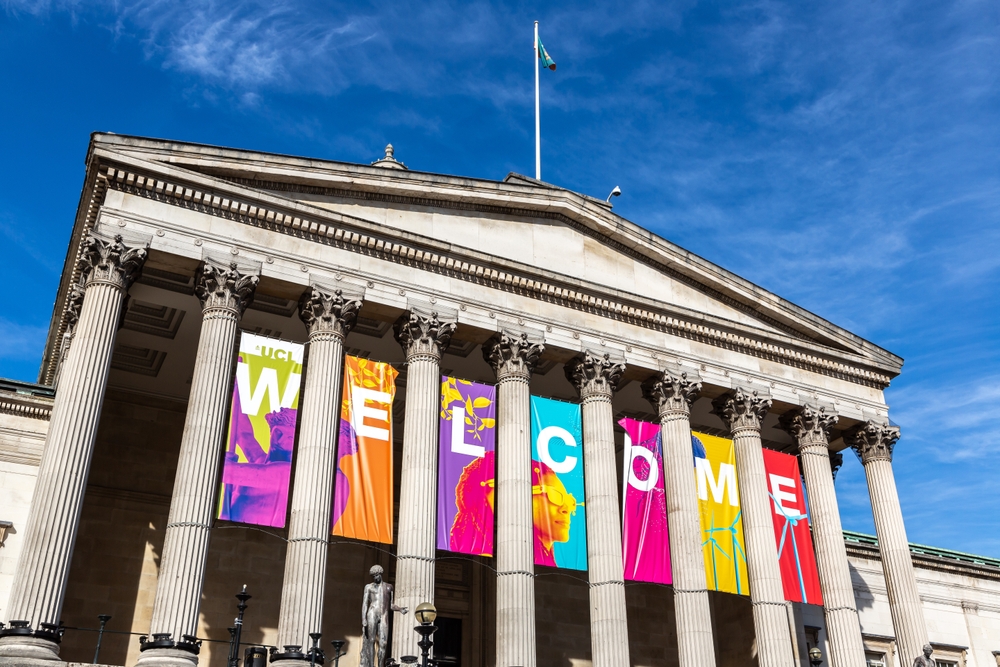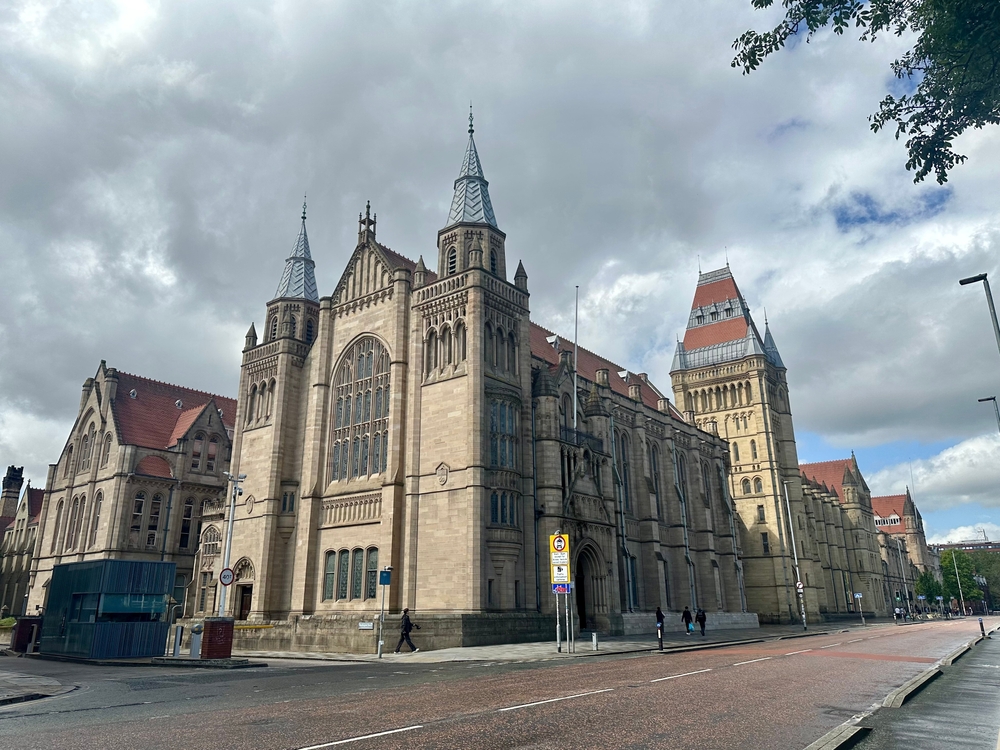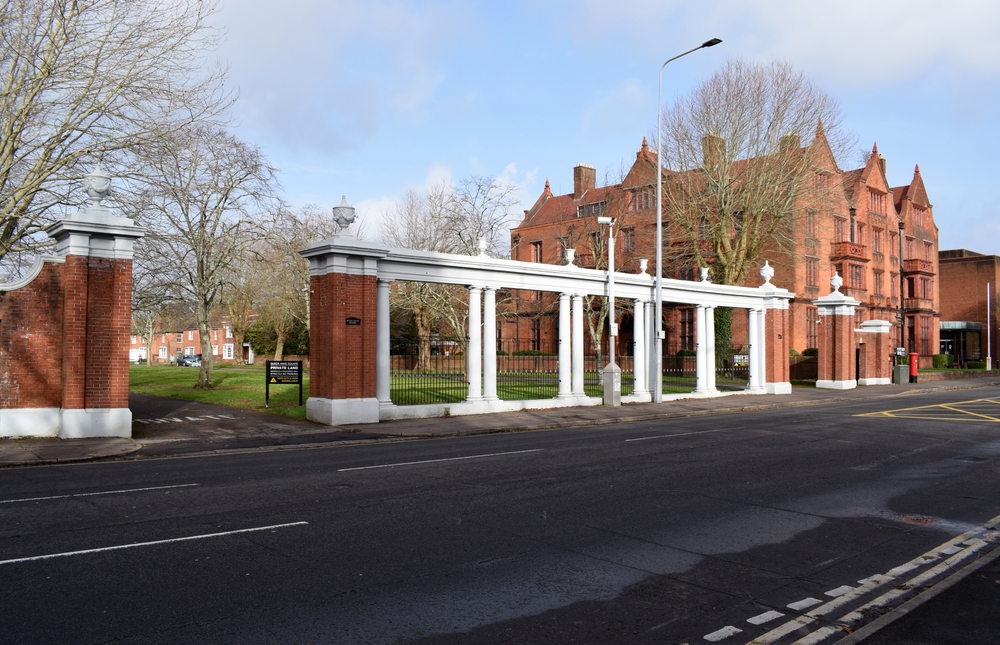UNIVERSITIES
Studying MBBS in Great Britain.
Studying medicine in England, Scotland and Wales

A closer look at studying MBBS degrees in the UK, Scotland and Wales is worthwhile for all the potential medical students. If you dream of a great career in medicine, the universities in the UK are the right place for Indian students. Medical education in these culturally rich countries has an excellent reputation worldwide and the medical degree is highly recognized.
Are you interested in studying medicine in the UK?
We would be happy to advise you free of charge about your options for studying medicine in the UK.
The advantages of studying MBBS in England, Scotland and Wales
As you probably already have a good command of English from school, you don't need to learn a new language to pursue MBBS in the UK. By studying there, you will have the opportunity to perfect your language skills and also learn medical English. Being fluent in one of the world's most widely spoken languages has many advantages in your future career and enables you to communicate with patients from all over the world.
But these are by no means all the advantages of studying medicine in England or its neighbouring countries.
Excellent training and a strong practical focus
Universities in the UK are very renowned and regularly occupy the top places in international university rankings. The British education system is characterized in particular by small learning groups and modern teaching techniques.
Studying medicine in England, Scotland and Wales is also much more clinical practice-orientated than in Germany. As a result, students there are usually much more confident in dealing with patients. From your second year onwards, you will be actively involved in the medical team at the hospital so that you can gain important practical experience.
Recognized in Germany and valued degree worldwide
A degree in medicine in England and other countries in the UK is internationally recognized and respected. This improves your chances of working or continuing your education in a wide variety of countries after graduation.
Thanks to the Bologna Process, your studies will also be recognized in Germany without any problems.
Modern healthcare system
The healthcare system in the UK, also known as the National Health Service (NHS), is considered to be very modern and comprehensive. The NHS was founded in 1948 and is one of the largest and oldest state healthcare systems in the world. Training in this ultra-modern healthcare system gives you the opportunity to learn how to provide optimum patient care based on the latest scientific findings.
Exciting country and modern student cities
The land of Shakespeare, Harry Potter and the Beatles has a rich cultural history and is known for its historical sites such as Buckingham Palace, Stonehenge and Tower Bridge.
Like other British metropolises, England's student cities offer a vibrant social life with numerous clubs, cafés and sporting events. The high quality of life, interesting architecture and numerous parks and green spaces characterise urban life in the UK. You can enjoy your time studying there in an international community with students from all over the world.

Together for success - futureMBBS and studying medicine abroad
Do you want to study medicine abroad and are looking for the most suitable university for you and don't really know where to start looking for the right country and a good university? futuredoctor is happy to support you!
Besides the Student advisory service In addition to selecting the university and accompanying you to the desired on-site appointments, futureMBBS also offers support during the application process and preparation for possible aptitude tests, as well as orientation at the place of study - including the search for accommodation! Get your application quickly and easily free info pack!
Universities in England, Scotland and Wales - Where to study MBBS in the UK
English universities offer a first-class medical education. The long tradition and history dating back to the Middle Ages is reflected in the buildings and traditions of the universities. There are over 32 medical faculties where you can start your medical studies. Below you will find an overview of the most popular universities in the UK.
University of Oxford

The University of Oxford is one of the best universities in the world and is the leading university in Europe according to the World University Ranking 2023. 155 new students are admitted to study medicine at Oxford University every year. Due to small course groups, there is a family atmosphere and close dialogue with tutors. The English university is known for strongly supporting the research and academic work of its students. The Bachelor of Medicine programme includes an experimental research project that medical students can complete in a subject area of their choice.
University of Aberdeen (School of medicine)

Medical teaching at the Scottish University in Aberdeen is spread over two main sites, King's College and Foresterhill Health Campus. The latter is one of the largest clinical complexes in Europe. The historic buildings of Kings College and the impressive Sir Duncan Rice Library create an excellent learning atmosphere. The teaching methods are modern and student-centred, and the staff are highly qualified.
University of Edinburgh (College of medicine)

International students wishing to pursue their MBBS at Edinburgh Medical School can enjoy learning from imperial college faculty , as the University of Edinburgh's medical faculty is known for training its students to become world-class doctors. The Scottish university has been one of the top 50 universities in the world for over 400 years. A particularly large focus is on research. Edinburgh Medical School has five major research institutes with over 500 employees who regularly publish their latest medical findings.
University of Cambridge (School of Clinical medicine)

The School of Clinical Medicine consists of the Cambridge Biomedical Campus and Cambridge University Hospitals NHS Trust. Studying medicine there offers you the opportunity to study in one of the UK's most exciting medical centres. Excellent teaching and research ensure that students receive a high-quality education.
University College London (Medical school)

This university has been training doctors since 1834. The MBBS programme at UCL Medical School is one of the best in the world. In the QS World University Ranking by Subject (2023), UCL Medical School is ranked 6th. The lectures for the human medicine degree programme there take place at the medical faculty in the heart of London. In co-operation with numerous teaching hospitals, first-class practical medical training is also guaranteed.
University of Manchester

The University of Manchester is home to the largest medical school in the UK and offers almost 400 new medical student places each year. Despite this large number of students, the classes are very small, so that optimal support for students can be guaranteed. From the first year, you will begin to develop your practical skills and apply what you have learnt in real-life situations.
Cardiff University (School of medicine)

Cardiff University's Faculty of Medicine is recognised as a major international centre for research and teaching. The combination of advanced healthcare training and patient care with first-class research and outstanding teaching facilities are the best conditions for you to become a successful doctor.
Top 10 MBBS colleges in UK
Have a look at the top 10 colleges in the UK for pursuing MBBS for international students.
University | QS Ranking |
University of Oxford | #2 |
University of Cambridge | #5 |
University College London (UCL) | #6 |
Imperial College London | #8 |
King's College London | #13 |
London School of Hygiene & Tropical Medicine | #24 |
The University of Edinburgh | #22 |
The University of Manchester | #30 |
University of Glasgow | #48 |
Queen Mary University of London | #57 |
Studying MBBS in England, Scotland and Wales - Eligibility criteria
To be admitted to study MBBS in England, Scotland or Wales, you will need good academic records or high-school grades. The grade point average plays a subordinate role in the UK, where you can score points with internships in the healthcare sector or previous vocational training. A good letter of motivation is also particularly important. However, it is important for many universities that you had previously chosen science subjects such as chemistry, biology or physics. You can make up for a lack of knowledge in these areas in a foundation year.
As the medical courses taught in English, universities always require an official language certificate. For example, the IELTS or TOEFL certificate is recognized.
Most universities have an entrance test, the BMAT (BioMedical Admissions Test) or the UCAT (University UK Clinical Aptitude Test). Several BMAT (BioMedical Admission Test) sessions take place throughout the year, and the UCAT once a year. In terms of content, your logical and mathematical skills as well as your critical thinking and written communication skills are tested. There are numerous ways to prepare for the test. We can help you!
If you impress the universities with your letter of application and the result of your selection test, you will be invited to a personal interview in which you explain your motivation for studying medicine.
Documents required for Indian student to study MBBS in UK
Below is a list of documents required for Indian students to study at MBBS in UK.
- Diploma certificate
- Experience Letters with recommendations from supervisors (if any)
- Your updated resume (CV)
- Statement of purpose (SOP)
- A reference letter about your academics from any new professor
- Copies of UKCAT / BMAT/ GAMSAT scores
- Academic transcripts or evidence of prior academic achievements such as 10 + 2 certified sheets, bachelor's degree with their copies
- A certificate issued by your former institution
- A legitimate passport photocopy
- Certificate of English Proficiency (IELTS/ TOEFL/ C1 Advanced)
- A personal statement that explains why you are visiting the UK
- Prior UK student VISA photocopy (in case of availability)
- Financial capability Evidence
Studying MBBS in the UK - structure and duration
In terms of content, the degree programme in England, Wales and Scotland differs slightly from the German curriculum. The Duration of medical studies is usually also six years. The British education system is particularly characterised by small learning groups and an intensive tutor concept. This ensures an optimal exchange between students and teachers and provides intensive support.
This course is known as the "undergraduate programme". After six years of study, you will graduate with a Bachelor's degree (MB ChB). Many universities also offer a six-week "elective" abroad during this time. Popular regions include Africa (Ghana, Ethiopia, South Africa), Australia, the Caribbean, India or the United States.
Structuring of undergraduate studies
The structure of the medical degree program in England, Scotland and Wales is comparable to that at German universities. It can vary slightly between the individual medical universities in the UK, but is basically structured as follows:
The pre-clinical section takes place over the first two to three years. The duration depends on the respective university. The pre-clinical phase includes lectures, practicals and supervision focusing on biomedical and clinical sciences such as anatomy, physiology, pharmacology, pathology and microbiology. You will also learn practical skills such as resuscitation and communicating with and interviewing patients. These skills are promoted through workshops, GP teaching and joint projects. In the pre-clinical phase, you will also deal with the social and ethical aspects of medicine, such as the experience of illness, health inequalities and public health.
In your third year, you take on a new challenge and start a new career. academic year with a research-based full-time study programme. Students who are particularly interested in academic work have numerous opportunities to receive special support here.
Subsequently, from the fourth year onwards the clinic. You will now study all aspects of clinical medicine and healthcare. This practical experience is enhanced by rotations in hospitals and general practices. You will familiarise yourself with day-to-day work in various hospital departments. These include emergency medicine, obstetrics, surgery and anaesthesia. In your final year, you will also have the opportunity to assist a junior doctor and take on tasks yourself under supervision.
After the final examinations, the so-called "Foundation Year 1" or an "Internship" in which graduates can gain further practical experience and expand their clinical skills.
Following your undergraduate studies, you have the opportunity to continue with postgraduate studies in order to obtain a Doctor of Medicine (MD).
Syllabus of MBBS in UK
MBBS program includes a vast variety of subjects in which students must gain proficiency. The subjects in which students receive thorough academic preparation and practice are as follows:
Semesters | Subjects |
Pre-Clinical Semesters: 2 |
|
Para-Clinical Semesters: 3 |
|
Clinical Semesters: 4 |
|
Studying MBBS in England, Scotland and Wales - Living costs & tuition fees
The good quality of the renowned universities in the UK comes at a price. Tuition fees for MBBS course at most universities are around 10,54,467 INR (£10,000) per year, but tuition fees can reach up to 42,17,437 INR (£40,000), which puts them at the upper end of the European scale. Added to this are the fees for the medical entrance test, which most universities charge. Taking the UCAT, for example, costs 12,125 INR (115 pounds).
The expenses cost of living varies depending on the city and your personal lifestyle. You should expect to spend at least 1,58,153 INR (1,500 pounds) on food, rent and leisure activities.
To optimise the Costs of your medical studies abroad you have the opportunity to apply to numerous organisations for MBBS scholarships. Scholarships to apply.
How do I apply to study medicine in England, Scotland or Wales?
There is no centralised application procedure for medical studies in the UK. You have to apply directly to the universities and submit the respective Application deadlines Please note. To apply, you must submit a number of documents, such as your university transcript, a letter of motivation and the result of your entrance test. If you convince the universities with your letter of application and the result of your selection test, you will be invited to a personal interview in which you explain your motivation for studying medicine. However, below we’ve mentioned the step-by-step procedure of the application process:
- Firstly, gather all your documents and get them verified by the respective authorities.
- You can directly apply through the university’s website or through UCAS.
- To complete and submit your application form through UCAS, you will require to sign up and register on the UCAS website. Keep in mind that all applications must be submitted through the UCAS system to be considered. You can submit your application to five different universities using just one form. The incredible component of the admissions process in the United Kingdom is the opportunity to submit applications to up to five different universities, each offering a different set of degrees.
- Once you have submitted your application form, wait for the MMI (micro-mini-interviews) confirmation and invitation letter.
- Now that you have completed all the procedures that have been outlined above, it is now time for you to kick back and relax since, much like the examination of your profile, it will take some time.
- After clearing the MMI, you can wait for the final offer letter and complete your Tier 4 visa formalities after receiving the final offer.
As universities in the UK are very popular, a particularly good and complete application is important. futureMBBS will help you here with our experience and will be happy to support you on your way to studying medicine in the UK.
Top Specialisations for MBBS in UK
The MBBS degree offers many specialisations. Here we’ve listed some of the best specialisations that most international students choose while studying MBBS in UK.
S. No. | Specialisation |
1 | Plastic surgery |
2 | Trauma and orthopaedic surgery |
3 | Neurosurgery |
4 | Otolaryngology |
5 | Cardiology |
Jobs after MBBS in the UK
After completing your MBBS program, you can start practicing as a doctor in the UK by registering with the UK Medical Registrar and attaining a license to practice. To be eligible for a license, MBBS graduates must meet certain criteria:
Primary medical qualification
A minimum score of 7 bands in IELTS or equivalent eligible test scores as proof of English proficiency
Proof of medical, non-medical, and any other activity undertaken in the last 5 years, or since graduation.
A valid and reasonable explanation for any gaps in the academic or medical practice years (if applicable)
Below, we’ve mentioned a list of the potential jobs after MBBS program for international medical graduates, along with the average salary in INR for your reference:
Job position after MBBS | Average Salary per annum |
Gynecologist/Obstetrician | 2.03 Crores |
Invasive Cardiologist | 2.85 Crores |
Neurologist | 2.21 Crores |
Country and people: Things to know about Great Britain
UK or GB? The countries of England, Scotland and Wales form the United Kingdom (UK). Great Britain and Northern Ireland together form the "United Kingdom" (UK).
Tea time! The British love their flavoursome hot drink and drink more tea than any other nation. Tea is often served with a dash of milk.
Alcohol - know your limit! It is permitted to buy and consume alcohol in English bars. However, getting drunk on it is illegal!
Scotland's national animal The unicorn. Scotland is one of the few countries in the world to use a fictional animal as its national animal. Unicorns were often mentioned in Celtic mythology and are regarded as a symbol of innocence, purity and night.
Are you ready to realise your dream of studying MBBS in England, Scotland or Wales? Contact us today and start your journey with futureMBBS. We look forward to supporting you on your journey and working with you to realise your dream of a career in MBBS.
STARTING SHOT
What are you waiting for? 🎉
Order your information package now, find out about studying medicine abroad and get started as a medical student!
FREQUENTLY ASKED QUESTIONS
FAQs about studying medicine in Great Britain
What are the advantages of studying medicine in the UK?
In the UK, you will benefit from excellent education, small learning groups and a strong practical focus. In addition, your degree will be internationally recognised and you will improve your English language skills, which offers advantages in professional life worldwide.
How is the medical degree programme structured in the UK?
Medical studies in the UK generally last six years and are divided into a pre-clinical phase and a clinical phase, followed by a foundation year for practical experience.
What are the requirements for studying medicine in the UK?
You need a school-leaving certificate, preferably with science subjects. English language skills must be proven by an official language certificate. An entrance test and a letter of motivation are also required.
How much does it cost to study medicine in the UK?
Tuition fees vary, but are usually between 10,54,302 INR and 42,17,661 INR (£10,000 and £40,000) per year, in addition to living costs and entrance exam fees.
How do I apply to study medicine in the UK?
There is no centralised application procedure; you must apply directly to the universities. Important documents are your university certificate, a letter of motivation and the results of your entrance test.
Which well-known universities offer medical studies in the UK?
Popular universities include the University of Oxford, University of Aberdeen, University of Edinburgh, University of Cambridge, University College London and the University of Manchester.
Is studying medicine in the UK accessible to international students?
Yes, the programme is open to international students, but a good command of English and the fulfilment of specific admission requirements are necessary.
What career prospects does studying medicine in the UK open up?
A degree in medicine from the UK is recognised and respected worldwide, giving you a wide range of job opportunities in different countries.
Are there financial support options for studying?
Yes, there are numerous Scholarship opportunities for which you can apply to cover the costs of your studies.
29 countries for your medical studies
Netherlands
Groningen, Maastricht, Amsterdam, Leiden, Utrecht, Rotterdam
Switzerland
Basel, Fribourg, Bern, Geneva, Zurich, Neuchâtel, Lausanne
